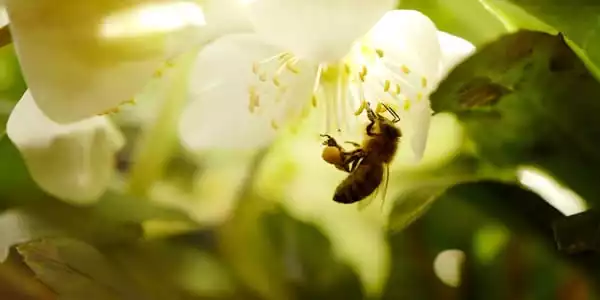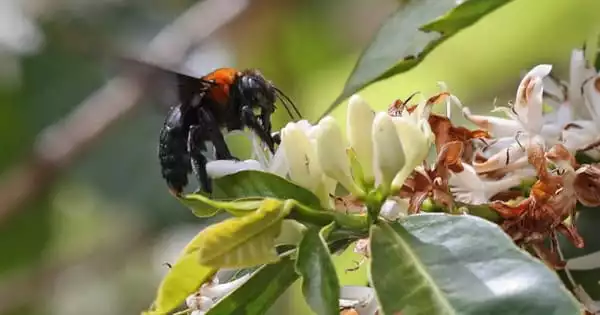Without pollinators, one-third of flowering plant species would not produce seeds, and the other half would have fertility reduced by 80% or more. As a result, while auto-fertility is common, it does not fully compensate for reductions in pollination service in most plant species.
About 175,000 plant species, or half of all flowering plants, rely on animal pollinators to produce seeds and thus reproduce. Pollinator declines could thus cause major disruptions in natural ecosystems, including biodiversity loss. This is the conclusion of a study published in the journal Science Advances titled “Widespread vulnerability of plant seed production to pollinator declines.”
According to Dr. James Rodger, a postdoctoral fellow in the Department of Mathematical Sciences at Stellenbosch University (SU) and the study’s lead author, this is the first study to provide a global estimate of the importance of pollinators for plants in natural ecosystems.
Dr James Rodger and Prof Allan Ellis of Stellenbosch University led the study, which included 21 scientists from 23 institutions across five continents (SU). It is the work of the German Centre for Integrative Biodiversity Research’s Synthesis Centre for Biodiversity Sciences (sDiv).
Without pollinators, one-third of flowering plant species would not produce seeds, and the other half would have fertility reduced by 80% or more. Pollinator declines could thus cause major disruptions in natural ecosystems, including biodiversity loss.
Dr. James Rodger
Prof Tiffany Knight, a senior co-author from the Helmholtz Centre for Environmental Research, says recent global pollination assessments have revealed a knowledge gap in our understanding of how dependent plants are on animal pollinators: “Our synthetic research addresses this gap, and enables us to link trends in pollinator biodiversity and abundance to consequences for plants at a global level,” she says.
While most plants are pollinated by animals, they also have some auto-fertility. This means they can produce at least some seeds without pollinators, such as through self-fertilization. However, until this study, there was no clear answer to the question, “How important are pollinators for wild plants?” on a global scale.
The researchers used pollinators’ contribution to seed production as an indicator of their importance to plants, comparing seed production in the absence of pollinators to seed production with pollinators present. Data on this existed, but it was dispersed across hundreds of papers, each focusing on pollination experiments on various plant species. To address this issue, researchers from various institutions began to consolidate data in databases. For the current study, all three databases were combined into a single database. It includes data from 1 528 separate experiments, representing 1 392 plant populations and 1 174 species from 143 plant families and all continents except Antarctica.

According to the findings, without pollinators, one-third of flowering plant species would produce no seeds, and the other half would have a fertility reduction of 80% or more. As a result, while auto-fertility is common, it does not fully compensate for reductions in pollination service in most plant species.
“According to recent research, many pollinator species have declined in numbers, with some even becoming extinct. Our discovery that a large number of wild plant species rely on pollinators suggests that pollinator declines could cause major disruptions in natural ecosystems” Dr. Rodger issues a warning.
Prof Mark van Kleunen, a co-author from the University of Konstanz, says that it is not a case of all pollinators disappearing: “If there are fewer pollinators to go around, or even a change in which pollinator species are most numerous, we can expect knock-on effects on plants, with affected plant species potentially declining, further harming animal species and human populations that rely on those plants.” Pollinators are important not only for crop production but also for biodiversity. “It also means that plants that do not rely on pollinators, such as many problematic weeds, may spread even more if pollinators continue to decline,” he adds.
Another concerning factor, according to Dr Joanne Bennet, a co-author from the University of Canberra who curated the GloOL database, is the positive feedback loop that develops when pollinator-dependent plants decline or become extinct: “If auto-fertile plants come to dominate the landscape, then even more pollinators will be negatively affected, because auto-fertile plants tend to produce less nectar and pollen.”
Dr. Rodger, on the other hand, believes that all is not lost. Because many plants live a long time, there is a window of opportunity to restore pollinators before plant extinctions occur due to a lack of pollinators.
“We lack high-quality long-term monitoring data on pollinators in Africa, including South Africa, despite some work being done in this area. We hope that our findings will spur more of this type of research so that we can detect pollinator declines and mitigate their effects on biodiversity” Dr. Rodger wraps things up.





